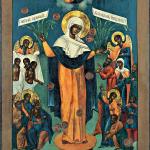THE MAN WITHOUT A COUNTRY: I just started Josef Pieper’s Concept of Sin, and was reminded of this novella. The basic plot is, a young hothead gets mixed up with Aaron Burr and ends up on trial for treason. In the heat of the moment he exclaims, “D–n the United States!” (dashes in the original), incensing the judge, who sentences him to an unusual punishment: He must spend the rest of his life in a kind of floating house arrest, transferred from ship to ship, never allowed to return to the USA or even hear news from his own country. So he spends the rest of his life repentant and yearning for home.
It’s a 19th-c. tearjerker, and I first read it when I was maybe nine? or thereabouts, so I can’t read it now without crying. The book stuck with me for years–I remembered most of the plot, and how powerfully it had affected me, long after I’d forgotten the title. So I was thrilled to rediscover it a couple years ago.
I think the book hit home for me for a number of reasons, all centering on the issue of alienation or exile. Philip Nolan’s situation mirrors the situation of the damned–his exile is his punishment, there’s no need to add extra torment, just as the sufferings of Hell are the result of our being cut off from God more completely than we can ever be in this life.
And Nolan’s suffering also mirrors our daily situation, our basic, deep-seated alienation, our sense that something has gone wrong and we are not at home. The book is unsparing in its portrayal of justice, the fact that his exile was deserved; and that too very much rang true to me. My sense of exile was always intimately tied to a sense of guilt. The sense of something wrong in the world was intrinsically connected to the sense of something wrong within the self–an anti-heliotropism, a straining toward sin. Heroism came from recognizing and accepting justice, acknowledging one’s own wrongdoing, and seeking to make amends.
More of me on alienation: here and here. More on what I learned from my early reading here.











